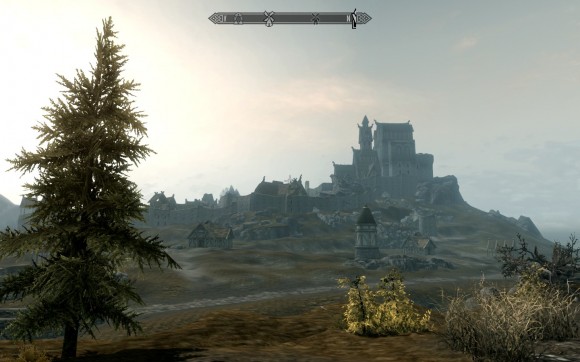
It’s almost half a year since Skyrim lumbered into the hearts and minds of gamers, trampling all before it like the openworld fantasy behemoth it is. This article is somewhat overdue, as it was originally planned for January.
This timing may be significant. There was, predictably, some backlash against Skyrim, as there is with any hugely successful triple-A game. At this point the baleful eye of the gamer hivemind has swung its focus elsewhere (Mass Effect 3 springs to mind) and Skyrim is no longer the centre of attention.
I mention all of this because I want to preface this article by emphasising that it is not intended as a review or analysis of Skyrim that is in any way objective. Instead it is as an attempt to explore and articulate just where Skyrim and I diverged, and to explain how I went away for a week an eager fan of The Elder Scrolls 5: Skyrim yet returned home with no desire to play it at all.
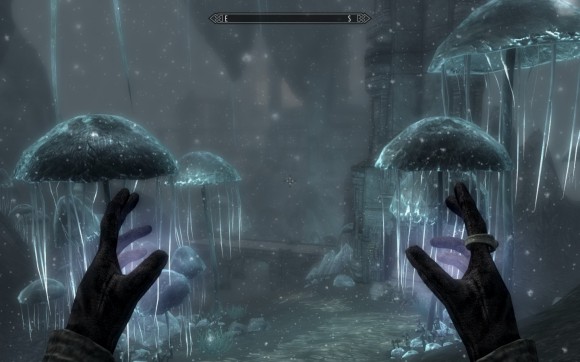
Everything began so well, and so Bethesda. Sat on the back of a cart, trundling through a beautiful landscape, listening to expensive scene-setting voice acting, and trying not to think too much about the limited animation as soon as people started walking around. Oh, but I’m already being snarky. This is unfair. The game really was beautiful, and the animation was much improved over past efforts.
I genuinely adored those early moments in Skyrim. I pursued the initial quests with vigour and ignored fast travel as much as possible, preferring to traverse the landscape and soak in the frigid landscape aongside the inevitable arrows of roaming bandits. Digging through dungeons felt fresh and exciting; the environments were so much more varied than those of Oblivion, and I was enjoying the new options around smithing and enchanting. Even the dual-casting of magic felt pretty cool.
I forced myself to ration the main quest, keen to avoid blowing through it too quickly, and instead explored various sidequests and odd caves I encountered on my travels. At one early point I set my heart on becoming a mage and dutifully trudged off towards the Mage’s College at Winterhold. It was a long journey and I’m not ashamed to say that thanks to easily-angered mammoths, tough and poisonous spiders and some fucking wolf packs I had to reload saves and restart the whole damn journey. Oh, remembering to quicksave, where are you when I need you?
Over time I completed the Mage’s College quests, began fighting more dragons (and winning), and began to develop a strong, focused character. Eventually I was perhaps sixty hours into the game and almost two acts through the main quest. I found myself spending more and more time fast-travelling back to town, flogging as much acquired loot as possible and working on my smithing and enchanting skills. Rearranging stuff in my house took up more and more time. But it was all worth it; better gear means surviving tougher fights means exploring bigger and nastier dungeons, which means better gear which means…
Something was niggling at the back of my mind. Then Christmas came around and I left my PC at home as I went to stay with my parents for a week. I took with me a netbook and a few novels.
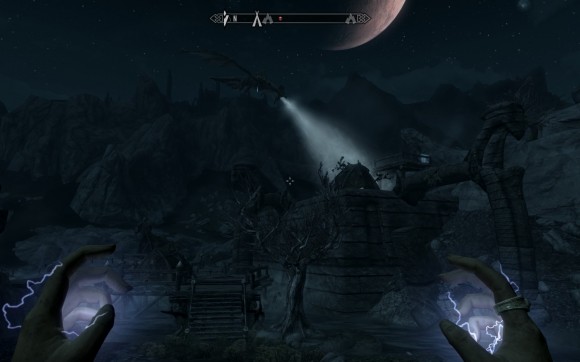
Last one night, a good few beers sunk and eight hundred pages into a novel, I felt suddenly compelled to write the following. I’ve tidied it up a bit as it was drunkenly and rapidly written, but it’s otherwise pretty much verbatim.
I was partway through my Skyrim playthrough – about seventy hours out of a projected one hundred plus playthrough in which I deliberately avoided a swathe of major quest/storylines for possible future characters – before I visited my folks for Christmas. I spent parts of this time away playing Planescape Torment and reading Neal Stephenson’s Cryptonomicon.
I mention these things because I have resolved to finish Skyrim as quickly as possible because it is, essentially, knowingly, gloriously, self-absorbedly, a time-sink. It demands your time, and in return it gives you crumbs.
But those crumbs! I have enjoyed every moment I’ve spent with Skyrim. And yet so few of those moments have proved memorable. So few have made me think. So few have made me care. I have become immersed in a world and in the self-generated concept of my character, but out of this experience so little emerges. This is not good enough. Given all the things I can do with seventy hours of my time, it is insufficient. It does not measure up. The game is capable of being pleasurable, but as a delivery mechanism for pleasure it is so woefully insufficient that I am no longer inclined to contnue. My focus has switched to other modes and mediums and, under the harsh light of contrast, Skyrim has been found wanting.
I will likely return to it. Certainly I shall finish it because I like to put a line through things, to put a full stop at the end of an experience and call it comprehensive. But no more than that, at least for the foreseeable future. My love affair with Skyrim is over. It has been a joy, but it has been a joy that has produced so few stories. It has been a one-night-stand inexplicably dragged out over the course of weeks or months; an increasingly passionless affair perpetuated through the simple aggregation of inertia.
It is unfair to compare Skyrim with a game like Planescape Torment or a novel like Cryptonomicon, because all three offer such different and divergent experiences. Certainly Planescape and Cryptonomicon offer a greater number and occurrence rate of fine, memorable moments, and their setting is drawn with far sharper observational writing and populated with deeper characters, but they don’t attempt to offer the freedom, flexibility or expanded world that Skyrim does, not to mention its almost unparalleled breadth. Nonetheless, the contrast I drew between my experiences with them threw my concerns with Bethesda’s latest release into sharp relief.
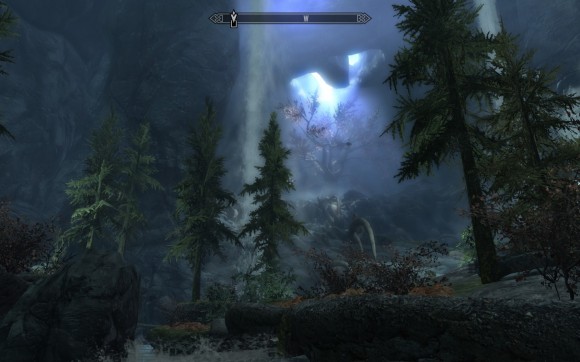
It ended up taking me almost three and a half months before I started playing Skyrim again. When I did, it was clear the moment had passed. I had a reasonable amount of fun going through the motions of playing out the third act of the main quest, but it felt hollow. I no longer cared about the world. Why should I?
No longer invested in the fiction, I was unable to pretend that my actions had any significance beyond the continued aggregation of stuff around my character. Loot. Incrementally drip-fed skills. Soundbites from nameless NPCs with overly-familiar voices. More and more tasks to undertake that seemed so familiar even before I began.
There is a hole at the heart of Skyrim. It is a hole that every player can fill with whatever they wish and the game will deliver some return depending on what is invested in it. But the emptiness is inherent, and when I recognised it and realised that I no longer wanted to give Skyrim my time and attention, I was shocked to discover how purposeless I had come to find the game.
This is not intended to pass judgement on anyone who likes the game, who liked the game, or who hated the game. I hope my ambivalence is clear. That said, I think I have identified three reasons why my attitude towards Skyrim flipped so powerfully and so quickly.
Firstly, because I am overly familiar with the core experience. I’ve invested four hundred hours across Oblivion, Fallout 3 and New Vegas (and to a lesser extent Morrowind). That is an awful lot of time to spend doing very similar things in very similar engines, even if the macguffins and aesthetics are always different. It is no surprise that I find myself getting fed up with the mechanics of explore > loot > sell > level up > repeat.
Secondly, and this may be more contentious, it is because I am so bored with the trappings of high fantasy in videogames. The bulk of your time in Skyrim is spent staring into the face of dull Tolkeinesque fantasy tropes that were played out long ago. Sure, in Skyrim the dwarves are all dead and gone, and the elves and men are all a bit different, but it’s still a cod-feudal world populated with the same things you always see in fantasy games. Dungeons, caves, ruins. Giant spiders, wolves, bandits. Swords, bows, fireballs. The trappings are familiar now to the point of contempt. Skyrim rarely seems self-aware regarding these tropes and rarely tries to step beyond them.
Looking back I can remember a number of moments where a sense of mystery overpowered my cynicism and weariness with Skyrim’s take on high fantasy. Exploring my first true dwemer ruin and tracking down the expedition which became lost within. Discovering and defeating the machinations of the followers of the Wolf Queen. The ruins of Saarthal and the Eye of Magnus. The madman buried deep in the ice with his dwemer artefact. The great observatories. The first time I realised what a Briar Heart was. I remember these moments fondly, but they were so few and far between.Each and every one of these memorable moments was so because it stood out, usually because it was not something I expected to find embedded in the game’s predictable and rote take on a fantasy setting.
Thirdly, my packrat sensibilities detracted from my experience. I wanted to spend my time exploring ruins, not backtracking and fast travelling to town to sell loot. Equally, I knew that this chore was necessary if I wanted to afford the better stuff in the game, and I also knew that regular trips to town were essential because shopkeepers have so little money on them at any one time (the latter I can blame on game design rather than my own playstyle, of course).
So that was it for me. I found myself at the conjunction of boredom with core mechanics and boredom with the overly generic setting, accentuated by my self-contradictory approach to playing the game. And that is why I am done with Skyrim, and probably the Elder Scrolls series, and probably open-world high fantasy games that offer similar gameplay.
This has been my personal experience with Skyrim. It is not a review. It is an attempt to present said experience and articulate just where things went wrong for me. And, perhaps, it is a statement of intent: to not endlessly revisit overly familiar game mechanics and experiences, and to pursue the fantastic in my fantasy settings, not the familiar.
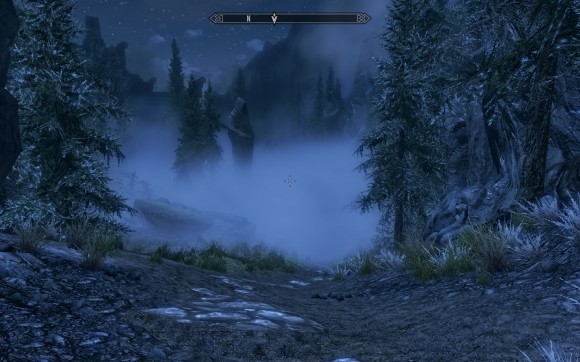
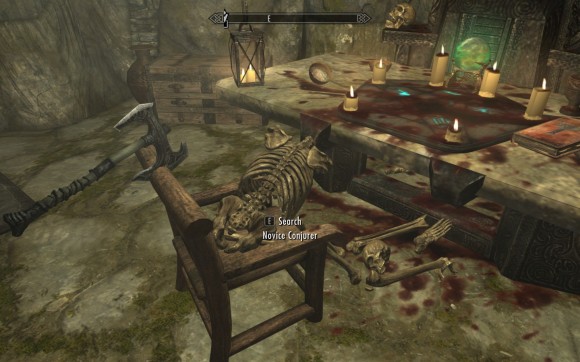
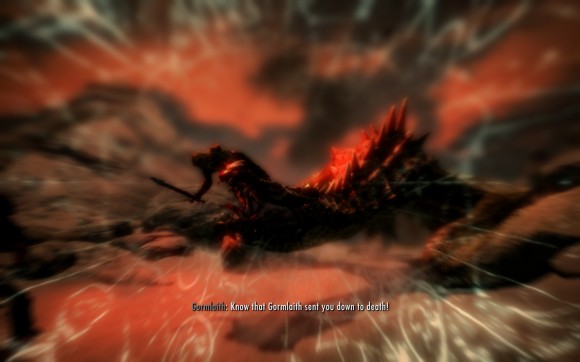
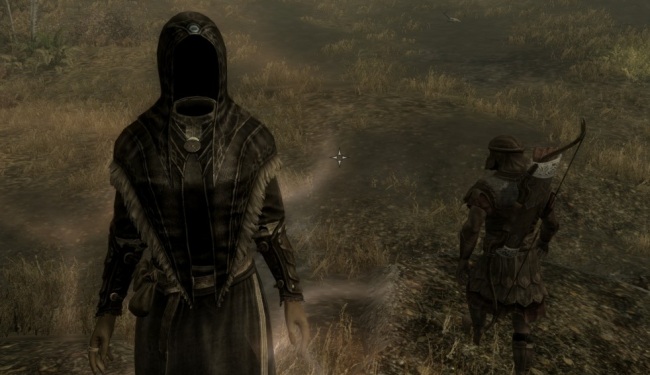
Comments
12 responses to “Travelling South for Winter: the End of my Skyrim Affair”
Absolutely Awesome post Shaun!
Not only do I agree with what you say about the game (I recently returned to it, having given up in disgust a few months ago) but I think you're working some really interesting and under-appreciated angles. Video game writing tends to focus on the early stages of a game and either unpacks the initial visceral reaction or develops a more muted attitude towards the rest of the game. You've done something different here and tried to unpack why it is that you fell out of love with the game.
Great piece of writing!
Mind you… I'm appalled that it took you until Xmas 2011 to read Cryptonomicon
Thanks a lot Jonathan, I appreciate the kind words. I'm not sure how often an approach like this will be applicable given the unique manner in which a sandbox game is engaged with by players, but I enjoyed writing it and hope to refine the style a bit more in future. This piece is very much a thing of parts.
It is pretty shocking. Stephenson has been on my "should read" list for about a decade but his books are so bloody vast that I'd steered clear. See also Hal Duncan and my unread copy of Dhalgren. ;)
I think 100% of my Level-1-only Master difficulty playthrough has been focused around toying with the game rather than playing the game, yet I made it part of ''my game''. I refer as ''toying'' the action of either finding exploits to survive, power-leveling skills and/or loot-hunting.
It might be strange that I consider actions which may very well be seen as ''that's not toying, that's PLAYING; the game is meant to be leveled; loot meant to be hunt down… that's how it's coded!'' but I can't agree they ever were part of a game. It's elements I find are put in a game to give you an incentive to play it more.
I've put 300 hours before completing the game on Master and at level 1 (and realize that the last dragon priest mask doesn't really match my outfit… so I stuck with Krosis in the end [which, ironically, is the first mask I found]). You might think ''Well, easy, with maxed out skills, you can take out anything''. That probably holds true for Oblivion, where they hadn't really introduced skill trees yet. Doing 50% of the normal damage while taking 200% of what you normally should is enough to get you killed even when several skills are maxed to 100 (and remember, staying at level 1 means, no points in ANY trees, or magika/health/stamina boosts).
While my Argonian has been running around shirtless with nothing but rags for clothes and, for armour, nothing but a pair of elven gauntlets and a Dragon priest mask (not to mention prefers Orcish weaponry)… I still had fun trying to find those same clothes and armour pieces to keep on matching my set (contre-jour effect yay: http://skyrim.nexusmods.com/imageshare/image.php?… ). Given I knew I was deliberately going to die naked like that, I made a point of using my dear Lydia as a shield and a valuable ally to gear-up and keep alive. I was to deal damage in the fights and every attacks needed to be thought out. In that effect, all enchantments on my ''hobo attire'' were focused on offence, while hers, defence. Early on, all encounters – for BOTH of us to survive – had to be planned ambushes. 3 falmers in a room spotted us? We might not make it out alive… Only now, can I START to go around places without Lydia. This doesn't mean I can just run in and out of places no problem. If I'm not sneaking, I'm as good as dead.
I forced myself playing my first playthrough with that harsh set of rules entirely because, for everything you've mentioned in there Shaun, I knew I was not going to find a purpose if I stuck with Bethesda's formula. I would have enjoyed my playthrough much more at times, died much less of course, but like you, I had played my share of Oblivion and Fallout. In the end, I regret nothing of my decisions. I knew Skyrim wouldn't be that different. I, as you said too, filled the hole Skyrim was with my own player desires. That desire was that it'd be the most challenging experience of 2012. So far, it has been.
Now I'm playing a ''casual'' playthrough, nearing 200 hours, on normal difficulty. Again, without player-set goals, it would be quite the hollow endeavour. This time around I still abide to a code of conduct: it's to be the complete opposite of my Master playthrough. No toying around, and well, ok I still have specific sets of armour i like, but I'm not enhancing them; I'm sticking to what the game offers me, well, except that one Blades Sword which I sharpened as much as I could. My goal is level 81 this time, and I'm starting, at level 79, to feel like it will be a long grind for the remaining skills (alchemy, speechcraft, block, destruction, restoration) to get to 100…
After this one though, I might find myself in the same position as you towards Skyrim. I'll admit though that when I hit 500 hours of Skyrim, I thought to myself ''damn, I could be half way through being fluent in another language had I spent this much time studying instead''. My nonchalant approach to that time-sink-of-a-game quickly faded. Now I feel BAD for having killed (and still kill) so much time in it.
And say that I had no love for that game at all the moment it came out and i tried to run it for the first time. I spent most of my first 100 hours raving about how full of bugs it was, impossibly hard it was (though that's my own damn fault) and being anxious about my girlfriend's experience of Skyrim since she was playing it on Xbox 360 and lacked the o-so-resourceful ''console'' command PC has.
I love that you derived such a great sense of play from the game. I always enjoy reading about or hearing from people who approach sandbox games in this way. I think I may be too serious for my own good when playing games, as my default position is to take a game's setting or framework at face value and 'play like I'm supposed to play' by going along with the fiction and adopting a more idle focus than power-levellers or exploit hunters tend towards. It's probably too long since I've been in games QA. ;)
Perhaps what my article above should really say is that there are several holes because Skyrim has several hearts, and different things can be invested into its mechanical possibilities and its narrative… paddling pool?
500 hours though, damn dude. That is impressive. :)
Very interesting Shaun. I also think "thinking about games" so much changes your perspective. You start analyse everything – to the point where you begin to notice the emptiness more than the beautiful splendour.
This hasn't encouraged me to play Skyrim, so good job.
It's going to come off a bit dreary, but I can't help but think ''thinking about x'' so much WILL slam a perspective which, in the end, will give you a hard time appreciating whatever splendour is there to find since it'll be so far and apart in the emptiness (read: vastness) of it all.
A bit like Life. I struggle with that one from time to time. But hey, life is totally worth it still. Kinda like Skyrim. So you shouldn't drop the thought of giving Skyrim a few hours!*
*of your life
I'm happy to have been of assistance, HM. Between myself and Walker, have we sufficiently put you off the biggest names on the last six months? ;)
You're quite right on the first point. It was also true of when I'd been working in QA to some extent, although then you find yourself trying to break the game rather than going along with it and noticing larger flaws (or at least, I did).
There is a void at the center of Elder Scrolls games. This is intentional: they are role-playing games, and it is your role-playing that is intended to fill it. They provide the world; it is you that are supposed to provide meaning. One problem TES faces that it is an inherently non-mainstream series with mainstream appeal–the games are played by many people who are not in fact looking for the kind of experience they offer. Role-players adore the freedom and the openness, others may see only the bare bones of the mechanics and be bored.
In the words of Ken Rolston: "The goal of every TES game is to create something that resembles a pen and paper RPG on the computer." Part of this they do well: open, immersive worlds and much less restrictions on the players than almost any other games out there. (Especially in the glorious Morrowind.)
One part where they fall very much sort is social aspect. Role-playing in pen and paper RPG emerges, or at least is expressed, in dialogue between the players. In TES there is only the one player and the game needs to pick up the slack; unfortunately in TES games so far, it doesn't. This, I think, is why the player so easily feels apart from the world: there is very little feedback, the game world doesn't really reflect the player's choices and actions back at him. Bethesda has failed to face this challenge for several iterations now, while working on packaging the games to be more mainstream friendly. Give me some neighbors to care about, drinking buddies to regale with the tales of my exploits. That'd be a start.
There are some assorted other problems, of course. The boring generic world of Oblivion was a real disappointment after the exotic Morrowind, and Skyrim is not a lot better. The loot grind persist from game to game. It's partially self-inflicted, though: you don't actually need to do it. There is no need to ever buy equipment, because you can find or make better stuff than is available in stores. The only use for money in Skyrim is to buy a house. But no gamer is going to leave all that valuable loot behind, and it's the developers responsibility to protect players from themselves.
Skyrim is no Morrowind, the best CRPG ever made, but it is in many respects a step up from Oblivion, which I find encouraging.
I think your third and fourth paragraphs there are pretty much on the money: the world, its populace, politics, economics and communities really fail to convince.
I'm not sure if you intended to imply that Skyrim is not for me because I fail to understand or engage with open-ended RPGs? I don't imagine you did as you're well aware of how much time I've spent meandering around in RPGs over the years (not to mention the fact that I loved Fallout 3 so much that I explored virtually every inch in it).
I wish I'd played Morrowind at the time. These days whenever I try I very quickly stop due to its clumsiness, its ugliness, its appalling draw distance, the fact that so much of its world is completely incomprehensible to newcomers (I like that I can explore a random area and get stumped by something weird, but I'm well past the point in my life where I've the mental energy to remember where said area was or what I got stumped by come the point twenty hours later when I can revisit it), and of course our good friend Cliff Racer.
I was speaking generally, but I did imply something like that. TES games give you a sandbox to find your own fun in, and if you fail to find it, it seems to me it wasn't the right sandbox. Guillaume found 500+ hours (and counting) of fun toying with the mechanics, there are hard-core role-players who can supply all that we find lacking and find a home in the virtual world. I say nothing about open-ended RPGs in general, just TES in particular; there is a distinct flavor. Nor do I mean there are no issues one may legitimately criticize.
For what it's worth, I'm not sure the sandbox is quite right for me either, these days. It is sufficiently big and varied many people find plenty to like, though. I return to Morrowind every so often, not so much to Oblivion. Skyrim… we'll see.
I think you may be handicapping yourself by trying to "play it like you are supposed to". From Morrowind's manual: 'One of the first questions people usually ask is. "What do I do in this game?" The answer we give is inevitably "Well, what do you want to do?" … No matter what your preference, there's no right or wrong way to play Morrowind.' If leveling up and accumulating loot is boring… don't do that. If the story is not engaging, ignore it.
The TES games these days are, I believe, compromises. There is the free-form core that really appeals to some people, and there is the more structured face on it that appeals to more. Commercially, there's more incentive to focus on the latter. I wish they'd either focus on improving the free-form core, because that'd be awesome, or commit to mainstream experience so I could ditch the series.
That's the dilemma of Skyrim. Oblivion rather looked like they'd decided on the mainstream route. There was still enough depth and freedom to tempt me, even though ultimately the experience was disappointing. Had Skyrim continued further on the same path, I'd have called it quits. But though still polishing the shiny, Skyrim also improved on the free-form side. They continue to maintain the uneasy balance where they attract people for whom the wilderness is too wild, as well as people who chafe at the limits imposed by the guide ropes.
I will note that the post-apocalyptic world of Fallout 3 is an almost perfect setting for the kind of experience Bethesda ends up providing for players like us. You are a stranger in a strange world, a virtual tourist in an intriguing artificial world, seeing the sights and piecing together its history. Society not being engaging is not a problem, as there hardly is any. You come to town, see what's there, blow it up and move on. And it does better than TES on reflecting back the effect you have on the world, from smoking craters to radio broadcasts of your exploits.
If Morrowind is too ugly for you, pimp it up. Draw distance, schmaw distance; who plays without the MGE and distant lands anymore.
I think you have hit quite a few nails on the head with that comment.
This article was of course about me falling out of love with the game: I thought it was a sandbox for me but, actually, I don't want to play there any more.
I'm not shallow enough to not play a game purely because of its visuals but that's certainly not the only thing keeping me away from Morrowind. I'll have a google at those mods though as I'd like to know what they are.